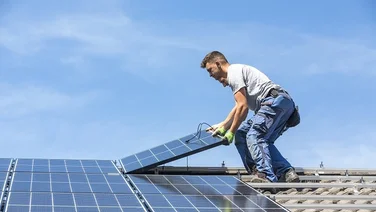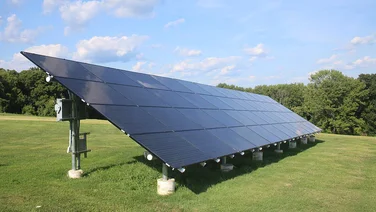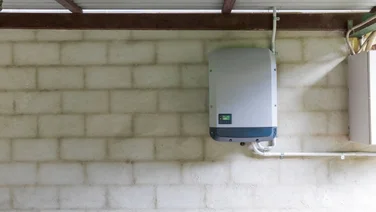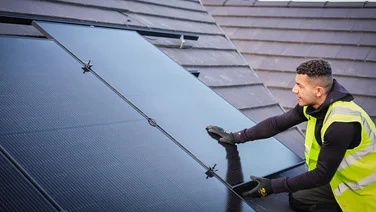We receive a small fee from trusted installers when you request a quote through our site. This helps us keep our content independent, well-researched and up to date – Learn more
- Are solar panels worth getting in Yorkshire?
- How much do solar panels cost in Yorkshire?
- Do solar panels work in Yorkshire weather?
- How many people have solar panels in Yorkshire?
- Solar panel installers in Yorkshire
- What do homeowners in Yorkshire think about solar panels?
- Government grants for solar panels in Yorkshire
- Next steps
- Summary
- Homes with solar panels in Yorkshire typically break even in 15.96 years
- Solar panels cut the average Yorkshire home’s electricity bills by 70%
- More than 121,000 homes have installed solar panels in Yorkshire so far

The cost of solar panels has fallen all over the world in recent years, including Yorkshire. If you call Yorkshire home and want to lower your energy bills, now is the perfect time to have solar panels installed.
The typical three-bedroom household in Yorkshire will save £441 per year by getting solar panels, allowing you to break even in 15.96 years and enjoy totally free electricity for the next decade or two.
In this guide, we’ll explain how much solar panels cost in Yorkshire, whether they work well in Yorkshire’s weather, and which solar panel government grants are available to you. These include the ECO4 scheme, Warm Homes Local Grant, and Solar Together (a group-buying scheme). There is also 0% VAT on solar panels and solar batteries.
If you want to get your own panels, you can compare solar panel prices with our help. Simply fill in this form with a few quick details, and our expert installers will be in touch with free quotes for you to compare.
Where do you want to install solar panels?
Get startedAre solar panels worth getting in Yorkshire?
Yes, solar panels are absolutely worth getting in Yorkshire because of the massive cuts you can make to your bills and carbon footprint.
The average three-bedroom home in Yorkshire will cut its electricity bills by 70% with solar panels on its roof.
For the typical household, this means cutting your electricity bills by £441 per year.
You’ll break even in around 15.96 years, and since solar panels last at least 25 years (some models can last 40 years or more), you’ll make an average net profit of £4,682.
Solar panels will also help you to reduce your dependence on the electricity grid – and if you choose to get a solar battery, your panels can even keep supplying you with electricity during a power cut.
If you’d like to know that latest solar battery price, have a look at our dedicated page.
Check with your supplier that the solar battery is capable of powering your home during a power cut, because not all solar batteries are. One battery that is capable is the Tesla Powerwall, which you can read about in our article on the best solar batteries.
Getting solar panels in Yorkshire will also shrink your carbon footprint by around 0.47 tonnes of CO2 per year. Multiple studies show your solar panel purchase will make your neighbours more likely to go solar too – increasing your green impact.
How much do solar panels cost in Yorkshire?
Solar panels typically cost £705 per panel to buy and install in Yorkshire.
For this price, you’ll usually receive a 350-watt (W) solar panel. To get the 3.5 kWp system we recommend for an average three-bedroom household in Yorkshire, you’ll need 10 panels for an overall cost of £7,050.
A one or two-bedroom home needing six panels will pay £4,230 on average, while a bigger house (four or five bedrooms) that requires 14 panels will typically pay £9,870.
To discover how much you might pay for a new solar panel system, check out our guide to solar panel costs.
If you’re ready to go ahead with your solar panel purchase, you can compare prices using the box below:
Where do you want to install solar panels?
Get startedDo solar panels work in Yorkshire weather?
Solar panels work excellently in Yorkshire weather.
This beautiful part of the country receives slightly less sunshine than the UK average, but still gets more than enough for you to massively reduce your electricity bills.
As a bonus, Yorkshire’s mild climate guards you against the likelihood of solar panel overheating. When solar panels reach temperatures of 25°C or more, they actually become less efficient.
And don’t worry about rain – solar panels do generate the most electricity under clear, sunny skies, but they still produce plenty of energy when it’s pouring. A downfall even helps to clear your panels of dirt and debris, making them more effective.
Read more about whether solar panels work under cloud cover.
How many people have solar panels in Yorkshire?
More than 120,000 homes in Yorkshire, according to the MCS dashboard..
Across the county’s 15 unitary authorities, that means at least 5.9% of all Yorkshire homes have gone solar, which is just above the UK average of 5%.
And since this figure only includes MCS-certified solar installations, the actual number of solar homes in Yorkshire is almost certainly much higher.
If you’d like to find out more about home improvement grants, read our dedicated guide.
Solar panel installers in Yorkshire
Here’s a quick list of some local solar panel installers operating in Yorkshire:
| Name of installer | Contact details | Additional information |
|---|---|---|
| Solar plus Yorkshire Ltd | 01423 322915 | Based in Boroughbridge, North Yorkshire, Solar Plus Yorkshire installs solar panels, solar thermal, and heat pumps. |
| P4 Solar | 0333 344 63 69 | P4 Solar has over 10 years’ experience installing solar panels and battery systems for homes and businesses in North Yorkshire. |
| Ecocute Yorkshire | 0800 246 1221 | Located in Doncaster, South Yorkshire, Ecocute Yorkshire provides solar panel and renewable energy installations. |
| GeoWarmth | 0191 257 1704 | GeoWarmth has been installing renewable energy systems, including solar panels, for over 15 years throughout Yorkshire. |
| Purelec Energy | 01924 840 198 | Purelec Energy has been installing solar panels in Yorkshire since 2014. |
All included solar panel installers are MCS accredited, which is a guarantee that a business meets strict industry standards for quality and competence.
Take a look at our list of the best UK-wide solar panel installers, most of which cover Yorkshire too.
What do homeowners in Yorkshire think about solar panels?
We spoke to solar panel owners in Yorkshire about what they thought about their solar systems. Bert Hofhuis, from Harrogate in Yorkshire, had this to day:
“We had a 4.2kW solar system installed last spring, going with panels from JA Solar, each one rated around 390W.
“They’ve got decent efficiency and were reasonably priced – without skimping on quality. We paired them with a Solis inverter, which has been working quietly in the background without any hiccups so far.
“The setup came with 12 panels on the south-facing roof, which gets a good amount of sun through most of the year, even in winter.”
“We also added a 5.2kWh battery from GivEnergy. I wasn’t sure at first if it’d be worth the cost, but now I’m glad we did. It covers the evenings and helps during peak rate hours, and during summer, we barely used the grid!
“I’m delighted with the system. It’s saved us a chunk on energy bills and gives peace of mind with prices being all over the place. So I’d recommend it, but only if you plan to stay put for a while because it’s a bit of an upfront investment.
“Just make sure the installer knows their stuff – I got three quotes and went with the one who didn’t give me a sales pitch but looked at our usage patterns and roof layout properly.”
Government grants for solar panels in Yorkshire
You can access two government grants for solar panels in Yorkshire: the Energy Company Obligation (ECO4) scheme and the Warm Homes Local Grant.
Here’s how you can potentially qualify for these grants, and how to take advantage of them.
ECO4
The government’s ECO4 scheme compels large energy suppliers to fund the installation of domestic improvements such as solar panels for low-income households.
If your home’s heating system is fuelled by electricity, you may be eligible for free solar panels, as long as you tick off any of the following criteria:
- Your total household income is less than £31,000 per year
- You were referred to ECO4 by your doctor, energy supplier, or local authority
- You receive any of a list of specific government benefits
You might also be eligible for free insulation through ECO4, as your property must be well-insulated before you’re allowed to get free or subsidised solar panels (a fabric-first approach)
To begin benefiting from ECO4, just get in touch with your energy supplier or local authority.
LA Flex
If you don’t qualify for the ECO4 criteria above, you may still qualify for the Local Authority Flexible Eligibility initiative, also known as LA Flex.
LA Flex enables local authorities (such as the City of Doncaster Council) to expand the ECO4 criteria to assist low-income, vulnerable, and energy-inefficient households that don’t meet ECO4’s criteria.
A staggering 46.1% of fuel-poor households match this description, according to government data.
This initiative can get you hugely subsidised or free solar panels, like the main ECO4 scheme.
In Yorkshire, LA Flex is being managed by local councils. Contact yours to see if you could benefit from the national scheme, which has £500 million of funding to use each year.
Warm Homes Local Grant
The Warm Homes Local Grant is a government initiative that you can access in Yorkshire. Like ECO4, this grant can provide funding towards solar panels, as well as other home upgrades that’ll improve the energy efficiency of your home.
To quality for the Warm Homes Local Grant, you’ll need to meet some of the following criteria:
- Live in England
- Be in a privately owned property (either your own or your landlord’s)
- Have an Energy Performance Certificate (EPC) of D, E, F, or G (you can find out what your EPC rating is when you apply for the Warm Homes Local Grant)
Additionally, your household income should be £36,000 or less, but you might still be eligible for the grant if you either live in a certain postcode (you’ll learn whether you fall into a qualifying postcode when you apply), or someone in your household is receiving benefits.
Take a look at our tips on improving your EPC rating, in case you don’t qualify for any of the grants listed above.
Next steps
The next step is to look at your annual electricity usage and your roof, then work out how many solar panels you need – and how dramatically it could cut your energy bills.
Then you should get multiple solar panel quotes, to make sure you get the best deal possible for your home.
You can kick-start this process with our free comparison tool. Just fill in a few details and our trusted suppliers will get in touch with free quotes.
Summary
- The average cost of a 3.5kWh solar system in Yorkshire is £7,050, which will cover the electricity needs of a typical three-bedroom household.
- Over 121,000 homes have solar panels in Yorkshire.
- There are several solar panel grants to consider, including the ECO4 scheme, and Warm Homes Local Grant.
- You’ll break even on solar panels in Yorkshire after roughly 15.96 years – after that, you’ll profit from your solar panels for another 10-15 years.









